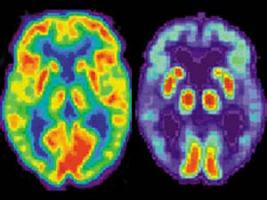Anyway, the National Institute on Aging and the Alzheimer's Association announced the first new diagnostic criteria for Alzheimer's in about 25 years - the last diagnostic criteria were released in 1984.
In brief, cases of Alzheimer's (arguably the most famous type of dementia) are growing exponentially. There are some rudimentary ways to "diagnose" it (although the only gold standard right now is by autopsy, which is slightly too late to help the patient), but there aren't that many treatments even if it is diagnosed. Plus, as Dr. Jon Hallberg says in a really well-done NPR segment, by the time symptoms appear the disease may have been present for at least 10 years. Not exactly the poster child for preventive measures.

Left, healthy brain. Right, Alzheimer's brain. Credit: NIA
It would be great to use MRIs, PET scans, clinical history or even biological markers to diagnose the condition earlier. But radiological testing is expensive (and in some cases still experimental), clinical history isn't up to the predictive level of biomarkers, and we don't have widely accepted blood tests or biomarkers for the disease yet.
It's great to have guidelines, especially if they spur new ideas and treatments. But, speaking of treatments, what good is it to know you have a disease if you don't have a way to prevent or stop it? The few drugs we have now slow the progression, but that's about it.
The NPR segment with Dr. Hallberg (who I happen to know - he's a fantastic guy and quite the science journalist himself) is, as I mentioned previouly, quite well done. It describes the problem in its context, discusses what we do now, what we could do in the future, and whether that's even a good idea, all in easy to digest bits. Read the short transcript here.
New Scientist also has a nice news briefing (read it here), but with more of a scientific bent (obviously). Here's the news release from the International Conference on Alzheimer's Disease on the new guidelines. Finally, here are the recommendations themselves (which are open for comment).





Comments